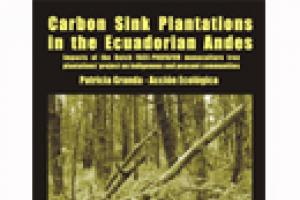On 13 May, over 400 young people of both sexes participated in an action against the plantations of the Japanese EUCAPACIFIC Company in the area of Tortuga, located in the Muisne Canton, province of Esmeraldas (see power point presentation of the action at http://www.wrm.org.uy/paises/Ecuador/Muisne_sin_eucaliptos.pps)
Ecuador
Bulletin articles
6 May 2006
Bulletin articles
6 May 2006
To the south of the Yasuni National Park (see WRM Bulletin No. 96), an unequal battle is being fought. Spears against shotguns.
The Yasuni National Park covers an area of 982,000 hectares. It is located in Huaorani territory and is part of the Intangible Zone where peoples of the Tagaeri and Taromenane ethnic groups live in voluntary isolation.
Bulletin articles
7 March 2006
The Cayapas-Mataje Ecological Mangrove Reserve in the Province of Esmeraldas covers an area of 51,300 hectares and within it is the Majagual mangrove covering 28,367 hectares. The mangrove is the habitat of crustacean species including oysters, blue crabs and shrimps and of tree species such as the red, black, white and jeli mangroves.
Other information
9 December 2005
In Ecuador three models of monoculture tree plantations coexist: the erroneously called “carbon sinks” belonging to the Dutch foundation FACE, the pine tree plantations in Andean communities promoted by organizations linked to the Church and the pulpwood plantation model. In this article we shall concentrate on this latter and more recent model.
Other information
14 August 2005
Thousands of indigenous peoples are displaced from their land, which is militarized and expropriated in an unending genocide. Oil exploitation is carried out – causing damages that go uncompensated – without consulting the communities and with the connivance of the government of the time. Transnational companies such as Shell, Repsol, and Maxus appropriate territorial spaces under the pretext that they are of “public utility”, they contaminate bodies of water and river beds, they deforest virgin forests and generate impacts destroying the future.
Bulletin articles
14 August 2005
From 17 to 23 July in Cuenca, Ecuador, over 1,300 participants from 80 countries in the five continents met under the slogan of “The voices of the Earth are calling” to analyze global health problems and to draw up health promotion strategies for all. The final declaration at the end of the event identifies neo-liberal policies transferring wealth from the South to the North, from the poor to the rich and from the public sector to the private sector, as the main cause of the worsening of the health conditions of the majority of the world population.
Bulletin articles
14 July 2005
The Yasuni National Park, considered to be a Pleistocene refuge and declared Biosphere Reserve by UNESCO in 1989, covers an area of 982,000 hectares and spreads out to the basins of the Yasuni, Conanoco, Nashiño and Tiputini Rivers. Its forests are host to the greatest number of species of trees per hectare in the world as well as a great diversity of species of fauna. The Huaorani indigenous peoples and some non-contacted groups such as the Tagaeri and Taromenane, live in the Yasuni Park. For this reason it is considered to be one of the most emblematic parks in the country.
Publications
2 May 2005
Impacts of the Dutch FACE-PROFAFOR monoculture tree plantations' project on indigenous and peasant communities
By Patricia Granda. Joint Research of Acción Ecológica and WRM
Carbon Sink Plantations in the Ecuadorian Andes
Bulletin articles
22 February 2005
The Latin American Network against Monoculture Tree Plantations (Red Latinoamericana contra los Monocultivos de Árboles - RECOMA) is a decentralized network of organizations from all the countries in the region, and its basic objective is to coordinate activities to resist the expansion of large-scale monoculture tree plantations in the region, either for the production of timber and pulp, for the production of palm oil or to act as “carbon sinks.”
Bulletin articles
27 October 2004
Huaorani culture and society is shaped by their will to self-isolation. Very little is known about their past, except that they have for centuries constituted nomadic and autarkic enclaves fiercely refusing contact, trade and exchange with their powerful neighbours, be they indigenous or white-mestizo colonists. Ever since their tragic encounter with North American missionaries in 1956, the Huaorani have held a special place in journalistic and popular imagination as "Ecuador's last savages".
Bulletin articles
27 September 2004
The integrity of the Yasuni National Park (PNY), located in the heart of the Ecuadorian Amazon is in serious danger from the imminent launching of oil activities by the Brazilian State oil company Petrobras (Petrobras Energia Ecuador).
Bulletin articles
29 July 2004
The certification process for organic shrimps in Ecuador is promoted by Naturland, a German certifying company that launched processes in 1996 to certify shrimp farming companies in the country and to achieve accreditation of a green seal enabling exporting companies to enter markets with better prices and standards of quality. The main markets for organic shrimps are Germany, Switzerland, France and the United Kingdom.

